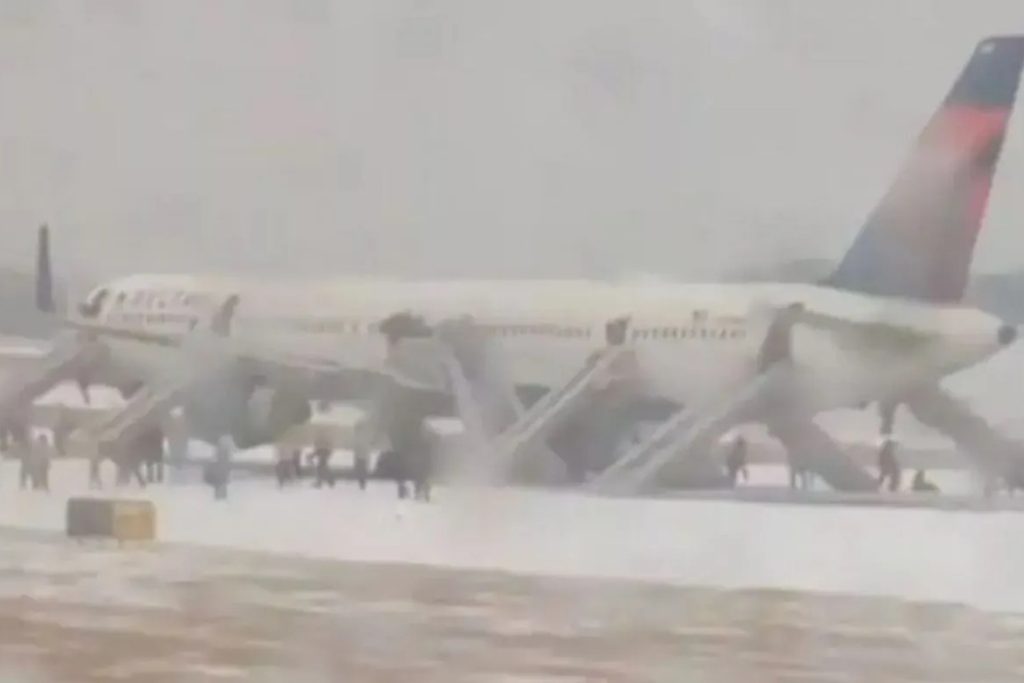The incident involving Delta Air Lines Flight 1297 at Hartsfield-Jackson Atlanta International Airport unfolded dramatically as hundreds of passengers were forced to evacuate the aircraft using inflatable emergency slides. The Boeing 757-300, carrying 201 passengers, two pilots, and five flight attendants, was preparing for departure to Minneapolis-Saint Paul International Airport when an engine problem forced the pilots to abort takeoff. While the exact cause of the engine issue remains under investigation, the incident occurred amidst a severe snowstorm that was causing widespread disruptions to air travel, including numerous cancellations and delays. The possibility of the weather playing a role in the aborted takeoff is being considered, though officials have not yet confirmed a direct link.
The evacuation process, captured in dramatic footage circulating on social media, showed passengers rapidly exiting the aircraft via the deployed emergency slides. The scenes depicted a sense of urgency as individuals slid down the inflatable chutes onto the snow-covered tarmac. While the evacuation was ultimately successful, the incident resulted in several injuries, though the exact number and severity remain undisclosed. Medical personnel were on-site to attend to the injured passengers, and subsequent reports indicate that none of the injuries were life-threatening.
Delta Air Lines responded promptly to the incident, issuing statements acknowledging the engine problem and the subsequent evacuation. The airline expressed its commitment to the safety and well-being of its passengers and crew, emphasizing that their priority was to ensure everyone’s safe disembarkation from the aircraft. Delta also initiated an internal investigation to determine the root cause of the engine malfunction and to review the overall handling of the incident. The National Transportation Safety Board (NTSB) is also likely to conduct its own investigation to determine the contributing factors and to recommend any necessary safety improvements.
The incident highlights the critical importance of well-defined emergency procedures and the effective training of flight crews in managing such situations. The rapid and organized evacuation of Flight 1297 demonstrated the effectiveness of these protocols, likely minimizing the potential for more serious injuries. The deployment of emergency slides, while a dramatic measure, serves as a crucial safety mechanism for swiftly evacuating passengers in the event of an emergency on the ground. The incident underscores the inherent risks associated with air travel and the necessity of stringent safety regulations and procedures to mitigate these risks.
The aborted takeoff and subsequent evacuation occurred against the backdrop of a challenging weather scenario. The severe snowstorm impacting the Atlanta area had already caused significant disruptions to air traffic, leading to widespread cancellations and delays. While the exact role of the weather in the engine problem remains to be determined, the challenging conditions likely added complexity to the situation. The snow-covered tarmac, while not directly causing the engine issue, could have contributed to the urgency of the evacuation, as it presented a potential hazard to passengers exiting the aircraft.
The incident serves as a reminder of the complex interplay of factors that can contribute to aviation incidents. While mechanical malfunctions can occur unexpectedly, external factors such as adverse weather conditions can exacerbate the situation and add to the challenges faced by flight crews. The investigation into the Delta Air Lines Flight 1297 incident will likely delve into all contributing factors, including the engine malfunction, the weather conditions, and the execution of emergency procedures, to gain a comprehensive understanding of the events leading to the evacuation and to identify any potential areas for improvement in aviation safety. This detailed analysis will contribute to enhancing safety protocols and mitigating the risks associated with future air travel.











